Protests In Iran Continued Thursday With Tabriz As Hotbed Of Unrest

Protests in Iran continued on Thursday with the northwestern city of Tabriz being the hotbed of unrest, with additional security forces deployed in the key city.

Protests in Iran continued on Thursday with the northwestern city of Tabriz being the hotbed of unrest, with additional security forces deployed in the key city.
Protests continued on Thursday in the capital Tehran as well as several other cities such as Rasht, Karaj, Mahabad and Esfahan, while workers of numerous oil, gas, petrochemical, pipe mills, sugar cane, and tire factories have been holding strikes.
Social media videos showed several bouts of violent clashes between the citizens of the Azari majority city of Tabriz, the capital of East Azarbaijan province, with people setting up fires and chanting slogans such as "Death to Dictator," referring to the Islamic Republic’s ruler Ali Khamenei.
According to reports, Internet access was shut down in Tabriz while in some areas even the mobile phone network was out of service. People were on the streets demonstrating well into the night.
The city of Marivan, in Kordestan province, was also a scene of protest rallies with many young women unveiling in public and chanting antigovernment protests.
The US-based Iranian Human Rights Activists News Agency (HRANA) reported on Thursday that at least 12,500 people have been detained in Iran, adding that at least 244 people, including 32 children, were also killed.
The group calling itself the Youth of Tehran’s Neighborhoods has mobilized thousands of protesters in several towns and cities through social media at a time of serious internet disruptions. Their latest call for protests was released on Wednesday for nationwide rallies on Saturday, October 22.

The US-based Iranian Human Rights Activists News Agency (HRANA) reported on Thursday that at least 12,500 people have been detained in Iran, adding that at least 244 people, including 32 children, were also killed.
Reports from Iran also indicate that despite widespread arrests among striking workers in the oil and gas industry and young protesters on streets, the uprising in Iran shows no sign of abating.
According to reports, several managers of Iran’s refineries and factories whose workers have been on strike since at least a week ago were arrested on Thursday, making the number of detained striking employees to well over 100.
A large number of journalists and activists have also been arrested since the beginning of the uprising, ignited by the death of 22-year-old Mahsa Amini in custody of hijab police last month.
Every day, more workers are joining the strikes which have been gaining momentum since last week as Iran’s antigovernment protest movement has entered its second month.
Earlier on Thursday, the Union of Truck Drivers announced that in support of the protests, they will not work on their trucks on Friday and will stop transportation activities.
On October 18, the workers of Haft-Tappeh Sugarcane complex in the southwestern Khuzestan province joined the strikes in oil, gas, and petrochemical sectors in southern Iran.
Workers of several phases of South Pars Gas-Condensate field, Bushehr Petrochemical Company and Hengam Petrochemical Company -- both of which operate at Asalouyeh Complex -- Abadan Petrochemical company and refinery, Mahshahr’s refinery and Pipe Mill Plant, as well as Neyriz Ghadir Steel Complex off the coasts of the Persian Gulf have been on strikes in solidarity with the protests across Iran.
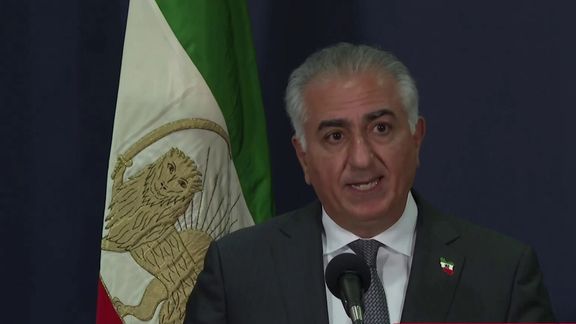
Iran’s exiled Prince Reza Pahlavi says the current events in Iran will change the world, and for this reason, the best for the world is a regime change in Iran.
In a speech in Washington DC on Thursday, he said the most important thing for the international community is to help change the Iranian regime if they want to resolve their concerns.
“This is the will of the people themselves, and in what language should people tell the world not to leave us alone?” he stressed.
He went on to say that if the foreign countries realize that the Iranian regime may be overthrown at any moment, they should have a plan regarding what to do next.
Furthermore, Prince Reza Pahlavi noted that the best way to achieve this goal is to have a dialogue with the real representatives of the Iranian people.
“Now the youth in Iran are objecting to the international community asking why they do not support their protests. They say we die with empty hands, and they shoot our children because our only demand is freedom,” underscored Reza Pahlavi.
He gave an example saying that if the world had not put pressure on South Africa, anti-apartheid activist Nelson Mandela would have died many times in prison.
Elsewhere in his remarks, the son of the late Shah said Iranians living in Canada can take the next steps and prepare the ground for an official dialogue between the government of Canada and the Iranian opposition.
Urging different Iranian political groups to be united to topple the regime, he said that "one of the excuses of the international community was the polylogue of different political opposition groups in and out of Iran. Therefore, “we must get united so that pro-democracy forces open dialogue with the world.”
“The most obvious matter is which scenario would be a win-win. The destruction of the Islamic Republic will solve many problems, including in some other countries such as Venezuela,” reiterated Reza Pahlavi emphasizing he is certain that under the rule of people a bright future awaits Iran, but “victory depends on our persistence and unity.”
In response to a question by Iran International, Prince Reza Pahlavi said at the current phase, the most important thing is to support domestic movements and seek cooperation between opposition inside and outside of the country.
Call For Transitional Government
“The more regime forces are disunited, the easier it is to fight until we reach the stage of collapse. From now on, it is necessary to plan for the transitional government,” underscored the prince.
Regarding his role in the future government of Iran Reza Pahlavi said “I only believe in a democratic secular government, and I do not see any role for myself. Our only goal is to reach the day when people go to the polls freely.”
“I have never sought power and I will not be a defender of any form of government in future elections. I respect all forms of democratic government.”
He further restated that most pro-democracy forces agree that a Constituent Assembly will decide on the differences between the groups.
“An interim government should take measures such as guaranteeing people's freedoms and rights, securing people's livelihood, regulating foreign policy to ensure Iran's interests, and holding a referendum,” noted the Iranian prince.
He also went on to say that the interim government of Iran must be pluralistic, otherwise it cannot build the foundations of democracy.
“The new generation has adopted decentralized skills and does not need centralized and individual-based leadership. I am glad that my attempt to advocate for a system-centered approach instead of a person-centered one was accepted by the Iranians,” he noted.
Call on Armed Forces to Defect
In another part of his statements, Prince Reza Pahlavi said all those who wear military uniforms, especially soldiers, are obliged to protect people’s lives and property and at least disrupt the regime’s repression mechanism.
He urged the armed forces to keep the oath they have taken and decide about their collaboration “with the weak regime and its helpless leader as soon as possible.”
Reza Pahlavi warned the armed forces saying that “anyone, who creates a rift among the people to shatter their unity, will only help the Islamic Republic to stay in power longer.”
Actions to Bring Regime to Its Knees
He added that some funds will be established in different countries to support strikes in Iran based on the laws of these countries. Also, a special fund may be established to cover the cost of Starlink satellite internet transmitters for Iran.
Reza Pahlavi went on to say that the International Criminal Court can deal with crimes in countries at the request of the UN Security Council members.
“We want even the guiltiest criminals in the Islamic Republic to be held accountable in a fair manner. This is our difference with the government of the Islamic Republic.”
He also called on the United Nations to form a commission in its Human Rights Council to deal with government crimes in Iran. He also urged UNICEF to conduct a special investigation on the killing of children in Iran.
Referring to the recent mass protests in Canada, Prince Reza Pahlavi said these protests led to effective sanctioning of 10,000 senior IRGC officers.
However, he pointed out that “these victories should not stop us but should become a launchpad to demand the expulsion of the diplomats of the Islamic Republic and stopping useless negotiations with the regime.”
He praised the “unprecedented unity” of Iranians at this juncture, saying that this movement has stunned the world.
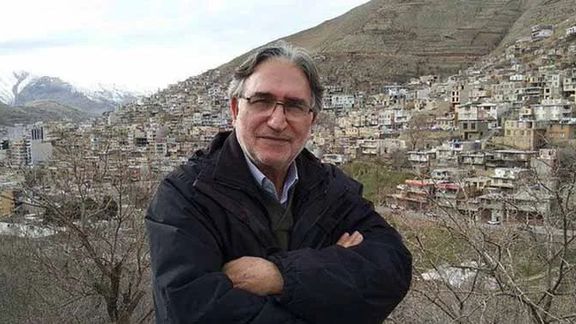
Mohammad Nourizad, a writer and political prisoner says the Islamic Republic has killed 200 people just to prove it did not kill Mahsa Amini over her hijab.
In response to a call by head of Iran's Judiciary, Gholam-Hossein Mohseni-Eje'i for dialog with protesters, Nourizad sent an audio file from Evin prison in Tehran saying that he is ready for dialog.
In this file, which is circulating on social media, the Iranian journalist has lashed out at Mohseni-Eje'i telling him that he is not fit to tell the protesters “Let’s sit down and talk and you can talk freely without going to jail.” Nourizad probably meant that the head of Judiciary is not the real decision maker, or that he is responsible for the brutal treatment of protesters.
Addressing regime’s President Ebrahim Raisi he made fun of his elementary school education level, saying that “a six-grader in the position of presidency is a big blow to elitism.”
“I swear to God that I am negotiating,” he said and added that the cleric, who has studied nothing but Arabic grammar, does not know anything about “human in society, generational society, the international community, interaction with others, and interaction using wisdom!”
This political prisoner also asked Iran’s intelligence ministry, the IRGC, and plainclothes agents to consider his message as a small protest and not to attack him.
In another part of his message Nourizad addressed the Supreme Leader Ali Khamenei warning that “a vast majority of people don’t want Mullahs (clerics). They don’t want Revolutionary Guard commanders. They don’t want brutal Basijis [paramilitary volunteer militia]. Believe this.”
Emphasizing that he is having a dialog and he’s not a separatist or a rioter, Nourizad also talked about the riot at Evin prison October 15, saying that “Shots were fired, RPGs were fired, Kalashnikov volleys were fired right over my head and around me. Do not insult people's intelligence, do not say that some people died due to smoke inhalation.”
“We saw blood and dead bodies in Evin. You call them criminals? We accept it, but they were human! Evin prison unrest could have been controlled with tear gas, not with live rounds, not with machine guns, not with RPGs!” he underlined.
A large fire spread in Tehran’s notorious Evin Prison Saturday evening as gunshots and blasts were heard. At least eight inmates were killed, and tens of others were injured in the massive blaze.
Some journalists and people on social media accused the Islamic Republic of setting the prison on fire intentionally.
There is no chance in Iran for any independent investigation as to how the blaze started and exactly how many prisoners were killed. The Judiciary is a political institution fully at the service of the ruling elite, directly under Khamenei's control.
Mohammad Nourizad signed a petition along with fourteen other dissidents in June 2019 demanding Khamenei’s resignation. The signatories were all arrested, and eight individuals were tried in a court without due process of law. They were sentenced to a total of 72 years in prison by in February.
Evin prison is home to many political prisoners, opposition figures, dual nationals, elites, and thinkers who just expressed their opinions and wanted to have dialog with the regime.
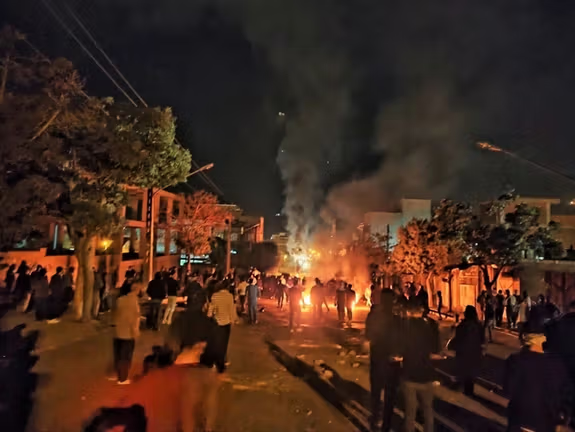
A human rights group has said the Islamic Republic’s security forces have killed at least 244 people, including 32 children,during the current antigovernment protests across Iran.
The US-based Human Rights Activists News Agency (HRANA) saidat least 12,500 people have been also detained since the beginning of the uprising, ignited by death of 22-year-old Mahsa Amini in custody of hijab police last month.
On Thursday, a regime insider and the deputy of Basij organization said about 70 percent of people arrested during protests are less than 20 years old.
The protests first erupted in Mahsa Amini’s hometown Saqqez and capital Tehran and soon spread to all over the country and garnered support from Iranian expatriate communities around the world as well as foreign governments and officials.
Young activists in Iran have formed a protest organizing group that seems to represent a new opposition force, successfully issuing calls for demonstrations nationwide.
The group calling itself the Youth of Tehran’s Neighborhoods has mobilized thousands of protesters in several towns and cities through social media at a time of serious internet disruptions. Their latest call for protests was released on Wednesday for nationwide rallies on Saturday, October 22.
In addition to protests, strikes by oil and petrochemical workers that started last week has spread to more plants, including contract workers at the South Pars natural gas fields that produce around 70 percent of the country’s energy needs.

The story of the death of a young Iranian man at the hands of government forces has uncovered new aspects of resorting to brutal violence against protesters.
Family members of a young protester, Mohammad Rasoul Momeni Rad, who was shot to death by security forces from a one-meter distance in the northern city of Rasht on September 21, say the agents beat him severely even after he was shot.
In an exclusive interview with Iran International they said his dead body was handed over for burial to his family only on the condition they keep silent regarding the details of his death.
His brother, Amir, who was with him in the protest, told Iran International that he and his brother were running from the security forces when regime agents shot Mohammad Rasoul from a one-meter distance.
“The two officers on a motorcycle beat the two of us with a baton and punched and kicked us after the shooting,” he added.
He noted that while his brother was bleeding severely the agents continued to beat them and finally ran away on their motorbike.
The victim’s mother also said the plainclothesmen did not even allow her to see the dead body of her son at the hospital.
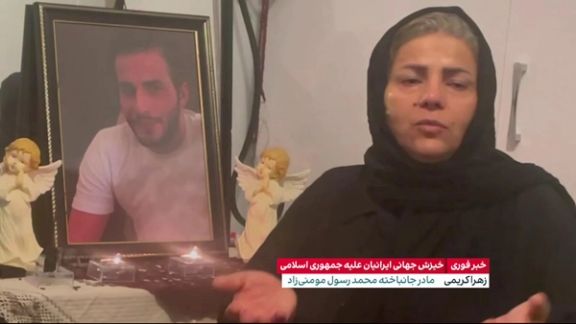
“Why did you kill my child with a gun from a meter away? What had he done? What should I do so that our right would not be trampled upon? I was not even allowed to see and kiss my own child,” she cried out.
Referring to the large presence of plainclothesmen at the funeral and other events, the mother said she had to remain silent during the funeral for the safety of her other children.
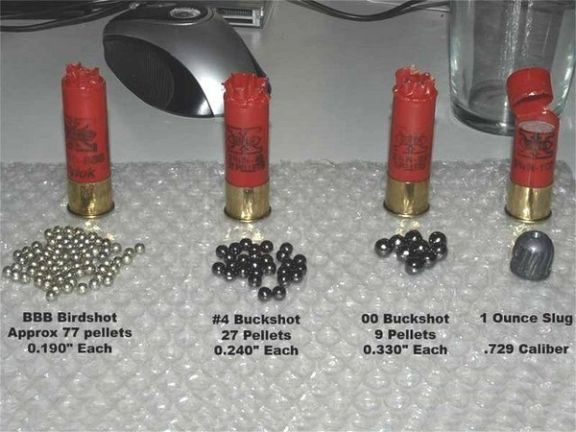
“I seek justice and I will not let my son die in vain,” she emphasized.
Mohammad Rasoul’s brother also added that the Forensic Medicine Organization falsely reported his brother had a liver injury. He said the bullet hit his brother in the armpit and his lower ribcage was torn apart.
According to a document received by Iran International, in this report, “being hit by high-speed metal pellets” has been announced as the cause of death.
On Thursday, a regime insider and the deputy of Basij organization said about 70 percent of people arrested during protests are less than 20 years old.
Earlier this week, a photo by a female protester showed the extent of the brutality of Khamenei agents in dealing with demonstrators.
In this photo of a woman from the city of Saqqez in the western Kurdistan province at least 150 birdshot pellets could be seen.
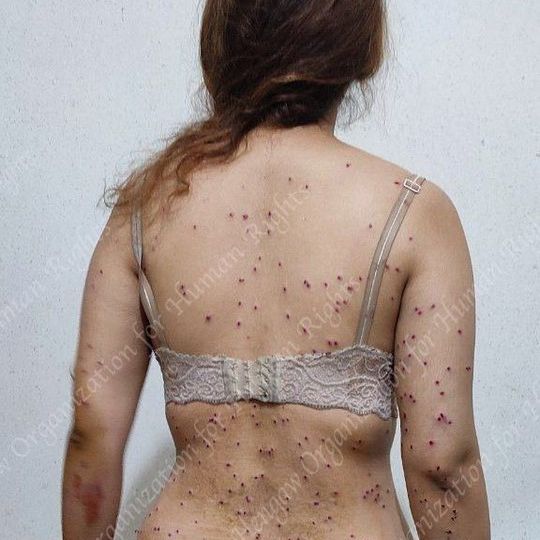
With respect to the size of her wounds, it seems to be a birdshot cartridge that contains 77 pellets. She was shot at least two times by a semi-automatic shotgun.
Shells containing birdshot pellets have multiple projectiles of varying sizes instead of just one slug or 9 pellets for large animals. They are devised for hunting small animals and birds, however, if fired at close targets they could kill people. Birdshot pellets can easily blind people if fired toward the face, as has happened to many Iranian protesters over the years.
Tweet unavailable